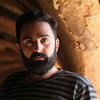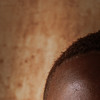
Follow The Leader [TOP100]
Two oryx in the Namib Desert in Namibia climb the tall sand dunes to catch the cooler, moist air blowing in from the Atlantic Ocean.
PRINCE B ELEAZER, United States, Allentown

Veins Through Water
Braided glacial rivers are common in Iceland, but seeing them from above is the only way to capture the true beauty that they hold. The colors created within the river are associated with the glacial runoff sediment mixing with the salt water from the ocean.
Matthew Borowick, United States

Sand Storm
Sometimes you need to look up in any slot canyons. Remote slot canyon in Arizona, USA
Alex Mironyuk, United States, Miami

Gardens by the Bay
Having a drone gives a unique chance to see the world as birds do. Gardens by the Bay is an amazing place, but from above it's even better!
Evgeny Vasenev, United States, Seattle

Sunrise glow in Lofoten Islands
Sunrise over Lofoten, Norway. February 2018
Carlos Cuervo, United States, Rancho Palos Verdes

Grizzly In Denali Fall
Large male grizzly foraging in the spectacular fall colours in Denali National Park, Alaska
Dan Twitchell, United States, Anchorage

Lightening Up
At Bisti Badlands, thunderstorm was forming in the distance. The scene looks like in prehistoric period. The bizarre rock formation added otherworldly touch. The picture was taken in August, 2018.
Aidong Ning, United States, San Jose

Spotted Owlet
Name: Musaddekur Rahman Bangladesh sadekrahman14@gmail.com
Sadek Rahman, United States, San Mateo

просто любим жить
Мы радуемся свету нового дня, даже когда знаем, что теперь на один день у нас стало меньше. Мы улыбаемся рассвету за окном, хотя знаем, что этот день больше никогда не наступит. Мы продолжаем двигаться вперёд, хотя не ведаем сколько ещё раз увидим утренний свет... мы просто любим жить
Pavlo Koche, United States, Glenville

City Soleil : Eager to learn
Cité Soleil is a small village within the Port-au-Prince in Haiti. Unlike its name–City of the Sun–however, it seems as though there is only a glimpse of light remaining. The city has become poor as its history of rebellion and conflict extorted its economic power. What is more, because the people were not able to have proper drainage system, their home was crammed with unfiltered waste and sewage. Some predict this was an expected outcome of the earthquake in 2010, but it is also true that their lives were under severe condition even before this tragic natural disaster. Overall, this part of the city today is experiencing extreme poverty and hunger, unemployment, formation of armed gangs, violations under violence, as well as various diseases and, for this reason, the United Nations has announced Cité Soleil as one of the most dangerous villages of the world. The UN Stabilization Mission (MINUSTAH) has been dispatched since 2004 in order to stabilize the violence but they withdrew since last October. The City of the Sun is on the brink of losing its light, so as it seems. Ironically, though, the majority portion of the population of Cité Soleil consists of children; that is, 65% of its population is under the age of twenty five. Wherever you turn your eyes, you will see children in this little village–children who are familiar with living amidst trash and pigs. Trash piles are their playground, their place of life. The children in this village are exposed to poverty and violence; they watch and learn from the adults, following their footsteps. They may have not chosen or expected life such as this one. No one does. This is not their choice but what they are born with. They embrace the given and live on within their environment. However, Another finding that surprised me was how passionate these children were about learning. Although many are in critical condition, there are schools here and there all throughout the village and many subjects are taught. Human beings can indeed adjust to their environment but one can nurture the courage to face it through learning. Saying no to their destined environment and learning continuously by dreaming for a better tomorrow, it was their passionate heart for learning that made it possible. This is their story—especially the narratives of the children who prevail in hunger but in sincerity.
Urim Hong, United States, Pasadena

Monument Valley
Monument Valley in Northern Arizona This is a 22 shot panorama
John Vermette, United States, Tucson

Morning breath
A stag in Richmod Park roaring early in the morning during the rut season. Taken october 2018.
Fartein Ringset, United States, North Bergen

Galactic Eruption
Patience won me this photo. I showed up around sunset, set my gear up, and waited until nearly 2AM when the galaxy aligned perfectly over the top of Mount Rainier, WA to create this dramatic image.
Lee Deutsch, United States, Bellingham

Löyly
There are only a handful of places on Earth like Hot Creek's active geologic setting in California, which makes it a nice addition to your next adventure when you visit Yosemite. Within the shallow gorge, groundwater heated by subsurface bodies of molten rock (magma) reaches the surface and mixes with the cool waters of Hot Creek, creating a picturesque environment with otherworldly features. Like most geothermal springs, the area is constantly changing and evolving. Once-active geysers and springs are now dormant or extinct, and new springs appear annually. Earthquakes can cause sudden geyser eruptions and overnight appearances of new hot springs at Hot Creek. The only negative about this place was that bright light in front of the mountains on the left. That is from a local airport. The rest of the ground is lit by pure unadulterated star light. 22 shots went into this 3 frame vertical panorama.
Rajesh Jyothiswaran, United States, Plano

Winter
The onslaught of shadows on a snowy day and a single tree among these shadows. This photo was taken in one of the villages of Kurdistan of Iran
Shakhavan Osmani, United States, Sanandaj

Olivia
I took this photo of Olivia in summer 2018, out in the country in North Carolina.
Anya Allen, United States, Charlotte

Cocoon
Cocoon is a body of work inspired by the human body, the human struggle and constant and ongoing transformation to simply be happy. We come into the world complete and in our own nature happy. However, social and cultural norms impose so much that goes agains our very nature that we take on and we make our own. In this project I aim to capture through my lens this perspective and the self-inflicted struggle of humanity such that the viewer sees themsel
Andreana Stoyanova, United States, Los Angeles

дети в кукурузе
Где можно найти счастливого ребенка? Ищите его в кукурузе!
Maria Tulchinskaya, United States, San Diego

Light Up the Sky
Tokyo, Japan Photo by Anthony Presley https://www.facebook.com/APresleyPhoto/
Anthony Presley, United States, Memphis

Looking through a prism
Photographer: @sergioartg Model: @jule_murph Location: Malibu, CA.
Sergei Goncharov, United States, Los Angeles

Oak Solo
The photographer created this image by taking 70 exposures as she walked a full circle around the tree. She then layered all the frames, one on top of the other, with varying degrees of opacity. As a result, the darker parts of the image represent a high number of pixels - pixels recurring in numerous layers -, whereas the lighter parts of the image represent pixels only occurring in a few frames. The accumulation of pixels thereby becomes a true two-dimensional representation of the three-dimensional oak.
Hilda Champion, United States, Naples

Snowstorm
I made this photograph purposely with a slow shutter speed so it would have an impressionistic feel.
Rudolf Sulgan, United States, Long Island City

Light Rays of Senja Norway
Beautiful Lightrays peak through the clouds in the early morning. After a night camping during a storm I was rewarded with a beautiful sunrise.
Ethan Johnson, United States, Knoxville

Emerald Lake
Emerald Lake is located in Yoho National Park, British Columbia, Canada. It is the largest of Yoho's 61 lakes and ponds. The first non-indigenous person to set sight on Emerald Lake was Canadian guide Tom Wilson, who stumbled upon it by accident in 1882."For a few moments I sat on my horse and enjoyed the rare, peaceful beauty of the scene." It was Wilson who gave the lake its name because of its remarkable color, caused by fine particles of glacial sediment, also referred to as rock flour, suspended in the water.
Oleksandr Mokrohuz, United States, Sterling

Future: LOVE
Simple, clean, clear... This is our Future and we need to embrace it. LOVE will launch us to better days.
Tatan Zuleta, United States, Miami

Reflections in Washington's Alpine
This photo was taken as the first light of morning hit the peaks in Washington's beautiful Cascade mountain range. While exploring this beautiful landscape, I came across this alpine tarn which shared with me its beautiful reflection of the surrounding peaks.
Nathaniel Cutshall, United States, Spokane

Magic of Twilight
Along sections of America's far NW coast, magical places exist. This iconic beach provides endless exploration, and the changing tides unveil distinct foregrounds from moment to moment. Here, a 3-second exposure transforms turbulent Pacific waves into sheets of frosted glass. Rows of algae-laden rocks lead out and converge on giant sea-columns that bask in the twilight glow.
James, United States, Seattle

Bloom
...and the secret garden bloomed and bloomed and every morning revealed more miracles...
Joelle Watt, United States, DuBois

Cuba
In Cuba people don't have big income so they try to make some black money any way and any where they can.
Moe Manouchehri, United States, mission viejo

Baobab trees under the milky way
The Baobab trees under the stars exude a glittering light, surrounded by silence, and occasionally can hear the soft whispers of the monkeys. This is a beautiful and peaceful summer night in Madagascar.
Kelvin Zhang, United States, Boston

Mary Magdalene
Ph Sergey Mayboga Md Lana Asanin Canon 6D, Canon 135 mm f 2.8, Profoto A1
Sergey Mayboga, United States, Нью-Йорк

Under cloudy skies
A family of elephants enjoy their early morning drink at a waterhole in Mashatu Game Reserve, Botswana.
Ali Dhanji, United States, Houston

Fur seal bonding
A newly born Fur Seal pup nuzzles his mother for warmth and comfort in the middle of a glacier melt stream.
Eric Keller, United States, reedsburg

Morning Glow
This photograph is from one of the barns along Mormon Row outside of Jackson Hole. It was taken just after sunrise after a night of storming. The clouds had cleared up just in time for the sun not to be blocked so it could illuminate the side of the barn and the tips of the Grant Tetons with a stunning orange glow.
RJ Smith, United States, Cumming

The Wave
This unique rock formation on the border between Utah and Arizona is like nothing else in the world. Mother Nature used erosion as its carving instrument to create a wonder in the desert that resembles the real oceanic waves, somehow made of liquid flame, magically frozen and petrified under the burning sun. You must be really lucky and win the lottery to get the permit to visit this place, but if you get there, you can spend hours in awe enjoying the scenery. https://en.wikipedia.org/wiki/The_Wave,_Arizona
Boris Lokhvitsky, United States, San Jose

Guarding the Coast
This image was taken at the Cliffs of Moher in Ireland on a Nikon D750 using a 24-70mm lens
KC Sandidge, United States, Combined Locks

Little Golden Gate...
April the 25th bridge, taken from MAAT (Museum for Art, Architecture and Technology) in Belem; Lisboa; Portugal
Poiarez, United States

The Majestic look
I have been to Jaipur a month back and the trip was so rewarding and I saw the beautiful Jhalana Jungle and its magnificent leopards.It was a lucky day when we just entered the Jungle on the first day morning, we wait at a point, as there were constant calls, after sometimes a leopard just crossed 10feet from our vehicle and it was a magic moment
SAMIUL KABIR, United States, FORT PIERCE

African eye's
If The God With Us Who Can Be Aginst Us أذا كان الله معنا من سيكون ضدنا
مصعب ابراهيم محمد أحمد إبراهيم, United States, Al fashir

Fairy tale
A fantastic photo session with a beautiful model Katia
Katsiaryna Drozd, United States, Portland

An opposite vision
This photo was taken at the zone of the 4 Tours in Madrid , I tried to capture this artichectrual detail from a new angle. Hope you like it.
Orkidea Ibrahim, United States

Carora Portrait
Случайная фотография сделанная во время съемок для рекламного каталога.
Dmitry Ostrovsky, United States, Walnut

When the Day Sky is fading to Night Sky
Sitting on the beach, watching the colorful sky, and listening to the sound of the breeze and the waves. Close your eyes and DREAM. * Find the ship
Irene Joy Felipe, United States

Powerful jaws
A big gator slowly drags its prey to the water, after wrestling for more than an hour. The fight happened about 200 feet from the water but it took the winner over 30 more minutes to finally reach the lake. Gators usually get tired very quickly and because of it they can take multiple breaks during a fight. Cannibalism between gators is more common that most people think. It is used to control their own population, but also when food is lacking.
Jadiel, United States, Orlando

Liverpool Museum
The picture shows the curve of the stairs in the Liverpool Museum. The skylight leads the stair as it goes up.
Yiming Liu, United States

Real Dream
Fog swallowed the jungle like a monster that swear everything. At the highest elevation in the forests of Shanderman from Gilan province, everything is wet and moist.
Masoud Shokrnia, United States, Newark

Cross Winds Marsh
Cross Winds Marsh, Mi What was farm fields before 1993 is now one of the largest man-made marshes in the country and easily accessible via more than 5 miles of foot trails, including 1.4 miles of boardwalk over ponds and streams. The marsh – and the 1,050-acre park – is a result of a land swap when nearby Metro Airport destroyed 200 acres of wetland to expand its runways.
Dragos Tranca, United States, Holland

Mama Fox
This mama fox caught her prey several miles away from her beloved pups. The fastest route home was along the busy highway of the Glacier National Park. We followed her for about 30 min respectfully keeping our distance. She wouldn't stop or run away from cars. It was so fascinating and admirable -the dedication of this little brave fox to bring the food to her children.
Valentina Khalimon, United States, Austin

Mumbai tree kids
While these kids live in the streets of Mumbai...they exude pure uncomplicated joy.
krishan bansal, United States, Frisco

Kotze
Mr Kotze is an old man who works hard, He is a good teacher. He has a great personality.
S.Hossein Hassanpour, United States, Las Vegas

Jellyfish
The jellyfish are inverted in the image so they actually swim with tentacles up.
Olivia, United States, Denver

Kiddie Artist
The photo taken in November 2018 displays a young girl is learning from her grandma how to make a bamboo rain hat. It took place in Guchun fishing vilage in Fujian Province, southeast China. Date: Nov 13, 2018 Camera: Nikon D800 Photo Parameters: F-STOP f/7.1 Exposure time 1/250 sec ISO speed ISO-4000 Focal length 39 mm
Changqing Wang, United States, Peachtree City

Autumn's tea time
Sharing a carrot cake, a warm tea along with a cozy fall mood. Don't worry about the rain, for here's an answer.
Viktoria, United States, Seattle

Боксирующая девушка
Девушка сидящая на полу в масле и боксерских пертачках
Daria, United States, Miami

Passage
"Passage" was born out of the stillness and the quiet of winter. Dead trees and leaves for months until that first slightly warmer day. One bird chirping is all it takes and on that morning is when this photograph was created.
Paul Warren, United States, Westhampton
Other cities:
35AWARDS 2018!
Loading...

